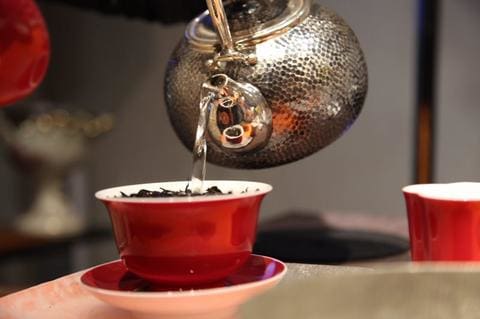
Make Your Tea Instantly Better – The Art of Pouring
Whenever you pick up a skill for the first time, the attention is usually given to the basics before moving on to more advanced techniques. At some point, however, that attention needs to be draw to the little details in order to progress with your development of that skill.

Exercise enthusiasts know this all too well. First, you learn how to do the exercise, then you learn variations that can make it more difficult, and finally you work on perfecting the form by making microadjustments to grip, hand spacing, elbow position, stance, etc.
While that might be the ideal progression, in the real world, we often jump back and forth between the three steps, sometimes finding a need to get “back to basics.” We’ve spent some time before discussing all of the various ways that you can prepare tea in our “Tao of Tea” series, but today we’re going to focus on one of those micro-adjustments that we might be taking for granted.
The Pour
Whether you’re using a gaiwan, an infuser, or a teapot, we all have to pour water over our leaves to make our tea. Most of the time, we do this quickly without much care or thought. However, how we pour our water can make a difference in the final taste.
What do you mean?
Whenever you pour the water over your tea leaves, it is best to pour the water slowly—in a controlled manner—and evenly. The goal is to saturate the tea leaves. This means that you want to pour your water in a circular motion, making sure that you wet every leaf, and you want to make sure your leaves are completely submerged. It may be preferable at times to vary your pouring speed. For oolongs, you may wish to execute a faster, more turbulent pour in order to induce a strong aroma, whereas for puerh tea, a slow pour will help to create a more desirable gentle and smooth liquor.

Why does this matter?
If your tea leaves are not completely submerged in the water, that means some of them are not extracting their tea chemical goodness into your tea. This disrupts the water: tea ratio that you carefully measured out, and when that ratio is disturbed, you’re not ending up with your ideal cup of tea. Sometimes the results are negligible, but sometimes it can cause your tea to become tasteless or bitter.
A similar problem arises when you’re not careful to saturate all of your leaves by distributing the pour of the water over them in a slow, circular motion. If you have ever spilled a liquid in your kitchen and reached for a paper towel, you can appreciate the effect. Like that paper towel, the tea leaves absorb water, and like paper towels, some of them absorb the water more quickly and others more slowly.
This in part has to do with the shape of the leaf, the oxidation level of the tea, and other chemical factors. Depending on how long you are steeping your leaves, you may not be letting all of your leaves reach saturation, which in turn ultimately affects the final taste of your tea. Tightly rolled teas are especially vulnerable to this.
To rinse or not to rinse?
In general, a tea rinse is neither good nor bad. If you’re concerned about the quality of your tea, a quick rinse can help wash away potential dust or other pollutants, much like rinsing a fruit or vegetable. The rinses are usually on the shorter side—one to ten seconds—and so they’re not likely to extract too many chemicals and affect the flavor of your first cup of tea. Another reason to rinse tea is to wake up the tea leaves, especially when brewing oolong, pu'erh, or aged dark tea.
On the topic of water saturation though, there are times where a rinse is appropriate. If you are preparing a tea that looks difficult to moisten properly, such as a tightly rolled tea, you may want to give it a quick rinse to help let it breathe and unravel. This will increase the likelihood that every tea leaf reaches saturation and contributes to that delightful taste of tea you’re craving.

Ju on
Thanks!